Insulators
An insulator is a material that does not easily allow the flow of electric current. This means that insulators have high resistance to the flow of electricity. In contrast to conductors, which allow electric current to flow easily, insulators are used to prevent the flow of electricity, protect against electric shocks, and to insulate wires and cables.
Properties of Insulators
Insulators have the following properties:
- High resistance: Insulators have high resistance to the flow of electric current.
- Non-conductive: Insulators do not conduct electricity and do not easily transfer heat.
- Electrical stability: Insulators can withstand high voltages without breaking down.
- Wide range of materials: Insulators can be made from various materials such as glass, plastic, rubber, and ceramics.
Examples of Insulators
Common examples of insulators include:
Applications of Insulators
Insulators are used in various applications, including:
- Insulating electrical wires and cables to prevent electric shocks and ensure safety.
- Insulating electronic components to protect them from external influences and prevent electrical interference.
- Insulating buildings to regulate temperature and conserve energy.
- Insulating pipelines to maintain the temperature of fluids being transported.
Study Guide
To understand insulators, consider the following study guide:
- Define what an insulator is and explain its role in electrical circuits.
- Identify common materials used as insulators and explain their properties.
- Compare and contrast conductors and insulators, highlighting their differences in terms of electrical conductivity.
- Discuss the applications of insulators in daily life and various industries.
- Perform experiments to test the insulating properties of different materials and observe their behavior in electrical circuits.
Understanding the properties and applications of insulators is essential for grasping the fundamentals of electricity and its practical implications in modern technology.
.◂Science Worksheets and Study Guides Seventh Grade. Sound
Worksheet/Answer key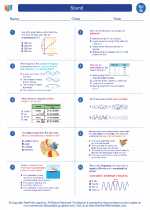 Sound
Sound  Worksheet/Answer key
Worksheet/Answer key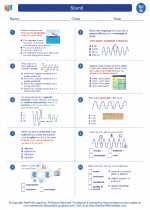 Sound
Sound  Worksheet/Answer key
Worksheet/Answer key Sound
Sound  Vocabulary/Answer key
Vocabulary/Answer key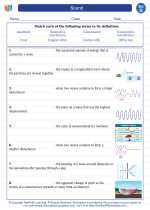 Sound
Sound  Vocabulary/Answer key
Vocabulary/Answer key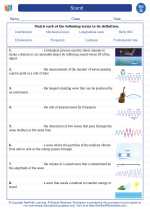 Sound
Sound  Vocabulary/Answer key
Vocabulary/Answer key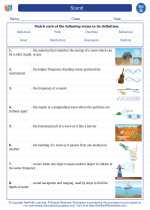 Sound
Sound  Vocabulary/Answer key
Vocabulary/Answer key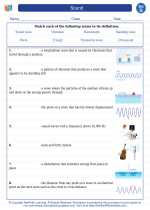 Sound
Sound 

 Worksheet/Answer key
Worksheet/Answer key
 Worksheet/Answer key
Worksheet/Answer key
 Vocabulary/Answer key
Vocabulary/Answer key
 Vocabulary/Answer key
Vocabulary/Answer key
 Vocabulary/Answer key
Vocabulary/Answer key
 Vocabulary/Answer key
Vocabulary/Answer key

The resources above cover the following skills:
Skills and Processes: Students will demonstrate the thinking and acting inherent in the practice of science.
Applying Evidence and Reasoning: Review data from a simple experiment, summarize the data, and construct a logical argument about the cause-and-effect relationships in the experiment.
Describe the reasoning that lead to the interpretation of data and conclusions drawn.